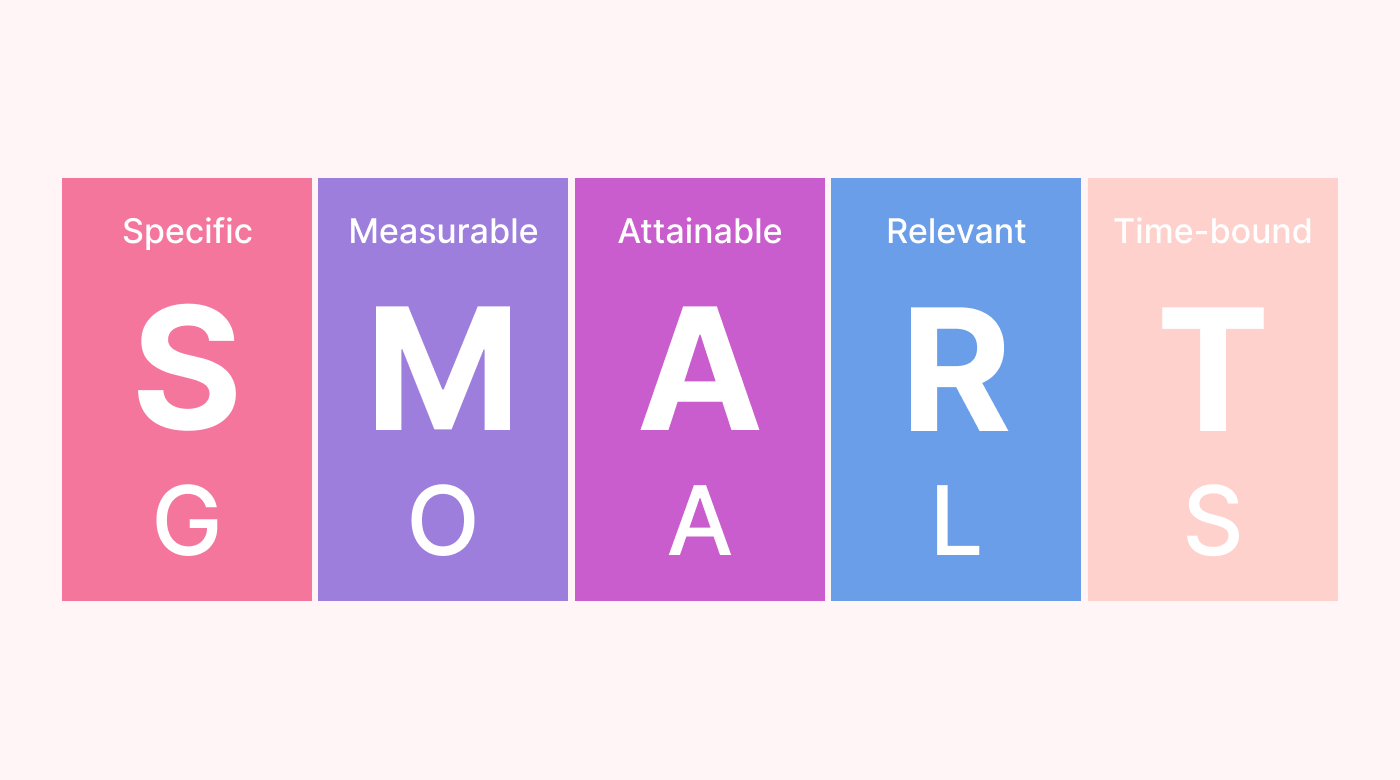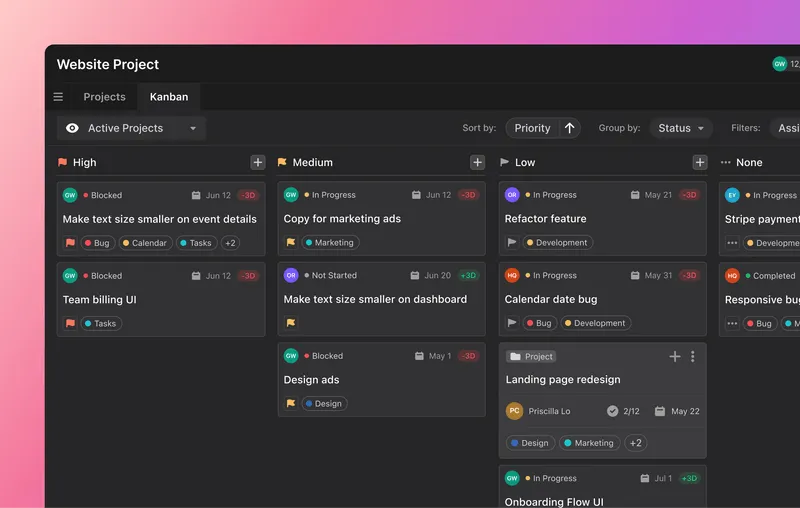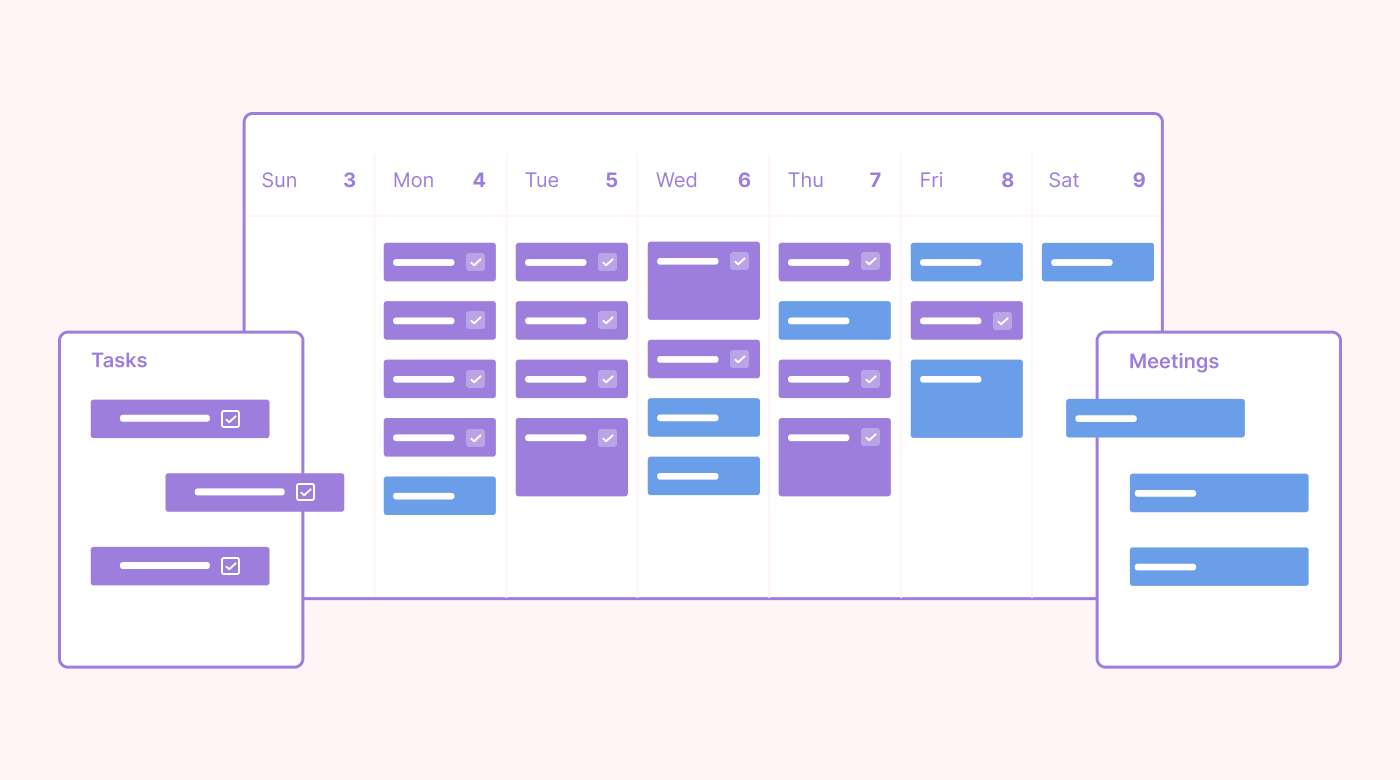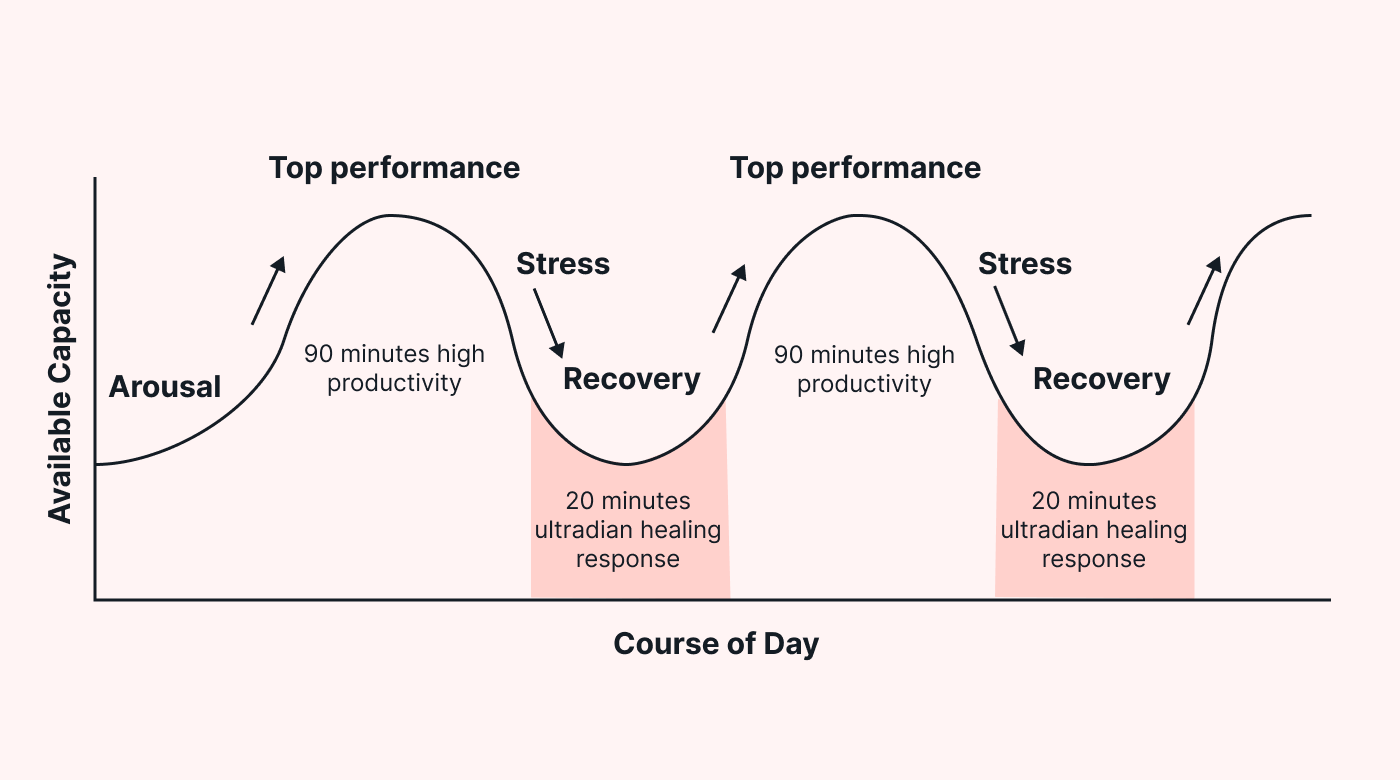Are you drowning in a sea of information? Feeling overwhelmed by the constant stream of data and struggling to make sense of it all? We’ve all been there.
While the digital age has made it easier to share and consume information than ever before, having so much of it right at our fingertips has resulted in information overload.
The thing is, too much information isn’t just overwhelming. It can impact our productivity, attention span, and well-being.
But there’s a way out of this mess.
In this article, we’ll delve into the causes of information overload and provide you with actionable techniques to manage and streamline information flow.
From prioritization and organization methods to effective filtering and decision-making approaches, we’ll arm you with the tools you need to thrive in today’s information-rich era.
Ready to take charge of your information consumption? Let’s dive right in and discover how to overcome information overload once and for all.
What causes information overload?
Contrary to popular belief, information overload isn’t unique to the 21st century. From Oscar Wilde’s frustrations to Seneca’s complaints, overwhelming floods of information have plagued minds for ages.
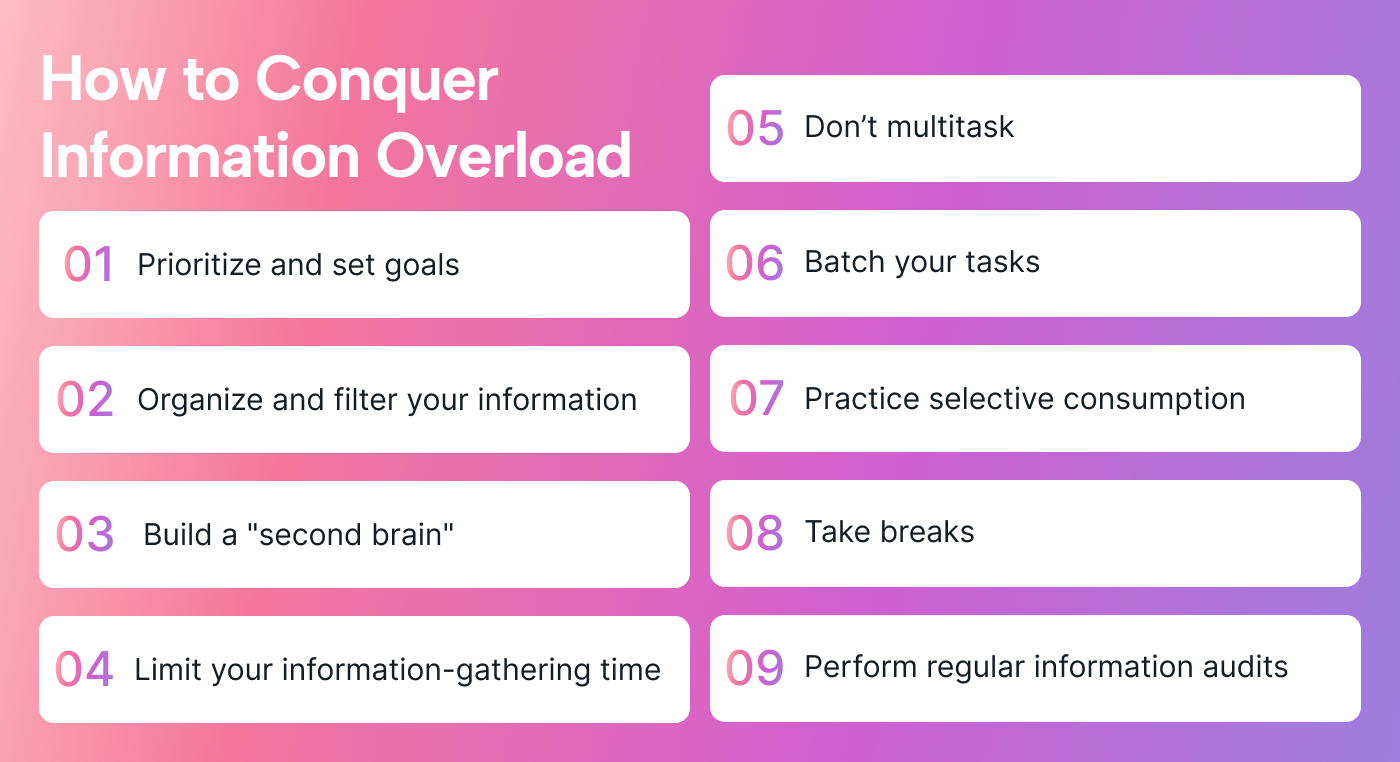 |
So what are some common causes of this never-ending struggle?
We’re swimming in an ocean of information: We’re bombarded with an avalanche of information sources every day, from blog posts to billboards and beyond. Filtering through this deluge and discovering what truly matters is a Herculean task.
The bottomless buffet of information: In our hyper-connected world, consuming information is too easy. Professor of Neurobiology Clay Reid nails it when he says, “The goal of so much of what’s online is to capture your attention.” No wonder we struggle to make sense of it all!
Separating the gold from the garbage: With the information floodgates wide open, how do we distinguish gems from trash? We’re caught in a never-ending battle, constantly scrutinizing sources and fact-checking.
The unrelenting 24/7 news cycle: Ah, the news media. It’s always on the go, churning out updates, breaking stories, and non-stop analyses. And with so much happening, how do we keep up?
What does information overload do to the brain?
“Our most precious resource is not time, as people usually think. It’s not time, but it’s attention,” declares Professor Reid. And with so many things competing for our attention these days, it’s no wonder that information overload takes a toll on our brains. Let’s take a look at some of its effects on our cognitive resources:
Cognitive overload: Imagine you’re juggling three balls. Easy peasy, right? But if you kick it up a notch — adding five or ten more balls to the mix — it suddenly becomes a circus act gone wrong.
This is what happens when our brains take in too much information. Processing, understanding, and remembering it all becomes a challenge.
Memory and retention challenges: Remember those days of cramming for exams? Math, biology, and English all squeezed into one week — how on earth can anyone remember it all?
Spoiler alert: we can’t. Just as those subjects often fade from our memory after our exams, the same happens with the flood of information we consume daily.
Decision-making dilemmas: Picture yourself standing at a crossroads with signposts pointing in every direction. Where in the world are you supposed to go?
Information overload disrupts our decision-making in the same way — progress stalls, uncertainty reigns, and indecisiveness runs amok.
9 tips for conquering information overload
“The abundance of books is a distraction,” observed the wise Seneca the Younger during Roman times. And guess what? This timeless wisdom still rings true today.
Here are nine tips to help you take charge of your information consumption:
1. Prioritize and set goals
Ever find yourself in a loop, reading the same text passage repeatedly? Or maybe those back-to-back meetings leave you with a pounding headache.
You’re not alone. But luckily, there’s a way out.
To conquer information overload, it’s crucial to clearly define your goals. Think of your goals as your compass, guiding you through the chaos and helping you zero in on what truly matters. Prioritizing them helps you focus on the information that’s relevant to you.
Remember, your goals should be SMART — specific, measurable, attainable, relevant, and time-bound. Setting SMART goals guarantees that they’re crystal clear, trackable, within your reach, directly connected to your objectives, and come with a well-defined timeline.
2. Organize and filter your information
It’s time to bring order to the chaos by organizing and filtering information like a pro. Here’s how to do this:
- Categorize for clarity by using labels to help you find everything you need later.
- Use bookmarking and note-taking tools to keep all your information in one place.
- Master the art of file organization by creating a logical hierarchy of folders and files.
- Tame your inbox by setting up filters and rules to automatically sort and prioritize incoming messages.
Motion gives you the ability to categorize and capture essential information without the need for multiple tools. Take all the notes you need for each task and project right in our project manager, and then label them so you can find them later.
3. Build a “second brain”
“Your mind is for having ideas, not holding them,” says David Allen, the mastermind behind the Getting Things Done (GTD) productivity method.
That’s why it’s beneficial to build yourself what productivity expert Tiago Forte calls a second brain — a place where you can capture, store, organize, and engage with information. Creating a second brain frees up your actual brain to do what it does best: higher-level thinking, being creative, and problem-solving.
There are many nifty tools you can use as your second brain. Note-taking apps, such as Roam Research, Obsidian, and Mem, let you visually connect your ideas, unraveling complex topics and illuminating the connections between different pieces of information.
Or maybe you’re more of a project management guru. In that case, Motion’s got your back. Our project management software organizes information visually, whether that’s in a Kanban board or list view, so you can see everything you need at a glance.
4. Limit your information-gathering time
Ever strolled down a supermarket aisle, amazed by the myriad choices? With so many options, it’s easy to feel overwhelmed if you aren’t clear on what you want.
The same holds true for consuming information. Without setting some boundaries, you’ll drown in a sea of options and find yourself trapped in a state of indecision. That’s a productivity buzzkill right there!
To combat this, set a time limit that forces you to prioritize the information you need to see first.
And remember that it’s okay to take action without having all the facts. In today’s fast-paced world, striving for perfection in information gathering can hinder progress.
5. Don’t multitask
Multitasking may create the illusion of superpower abilities, but it comes at a cost to your productivity and cognition prowess. The truth is that constant task-switching burdens your brain with unnecessary demands, sabotaging your ability to perform at your best.
So what’s the solution?
Embrace the power of single-tasking. Focusing on one task at a time lets you navigate through a singular set of information without being distracted by other duties.
To put this into practice, consider exploring techniques like the Pomodoro Technique or the 52/17 rule. With the Pomodoro Technique, you work in focused bursts of 25 minutes and then take a short, 2 to 5-minute break. The 52/17 rule, on the other hand, encourages you to dedicate 52 minutes to your task before taking a purposeful, 17-minute break.
6. Batch your tasks
Task batching is a productivity powerhouse that involves grouping similar tasks together for maximum efficiency. Doing this minimizes the mental strain of constantly switching gears and dealing with different sets of information.
Here’s how to batch your tasks:
First, break down bigger projects into bite-sized chunks that you can tackle one by one. Then, organize these tasks based on their similarities.
For example, try grouping all your high-concentration tasks together, and tackle them during your peak alertness hours. The tasks that require moderate concentration can be done after lunch, and those that need only a sprinkle of concentration can be saved for the end of the day when you’re less energetic.
7. Practice selective consumption
Imagine yourself at an all-you-can-eat buffet. Would you devour every dish in sight? Probably not!
The same goes for the information smorgasbord we face every day. That’s why it’s important to be mindful of the information we consume. Here’s how to be a selective consumer:
- Evaluate the quality, relevance, and credibility of the sources before investing time in reading or watching them.
- Cut back from mindless social media scrolling, and unsubscribe from irrelevant channels. Instead, stick with trusted sources that provide high-quality, relevant information.
- Don’t feel that you must tackle every task that comes your way. Learn to delegate and share the load with others so you can focus on the tasks that matter to you.
Speaking of delegating, Motion can empower you to view your team members’ schedules, assign tasks, and keep everyone on track with ease.
8. Take breaks
Taking a break acts as a reset button for your brain, giving it a chance to recharge and come back stronger than ever. Let’s dive into the science behind this.
Our brains operate on an ultradian rhythm — a natural cycle that consists of around 90 minutes of high-frequency brain activity followed by 20 minutes of low-frequency brain activity.
During high-frequency periods, our brains excel at sorting through and making sense of information. However, during low-frequency periods, our cognitive efficiency takes a dip. So when we push our brains non-stop, we’re asking for trouble. Hello, information overload!
That’s why taking breaks is so important. They give your brain a chance to recharge, improve your cognitive performance, and keep stress at bay, setting the stage for better productivity.
9. Perform regular information audits
It’s a good idea to clean out the digital attic every now and then. So review and declutter your information sources, subscriptions, bookmarks, and saved content.
But why bother with this task, you ask? Ditching outdated or unnecessary information lets you create space for fresh, relevant content to thrive — and that means lower chances of experiencing information overload.
Free up your mind with Motion
In a world overflowing with information, it’s easy to feel overwhelmed and lost. But fear not, for you now carry the tools to navigate these waters. Implementing the strategies we’ve discussed can help you regain your focus, enhance your productivity, and find serenity amid the chaos.
Want more help fighting information overload? Try Motion.
Our AI-powered algorithms automatically prioritize your tasks for you so you always know what you need to do first. This stops information overload before it even has a chance to develop.
We also know how hard it is to keep distractions at bay, so why rely on willpower alone? Motion’s anti-distraction system keeps you focused on the task at hand without using all your stamina.
Start your 7-day free trial with Motion and free up your mind today.


